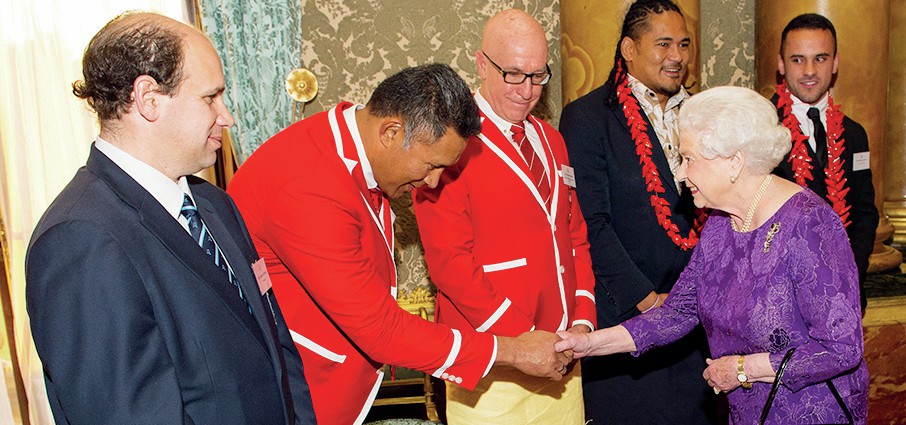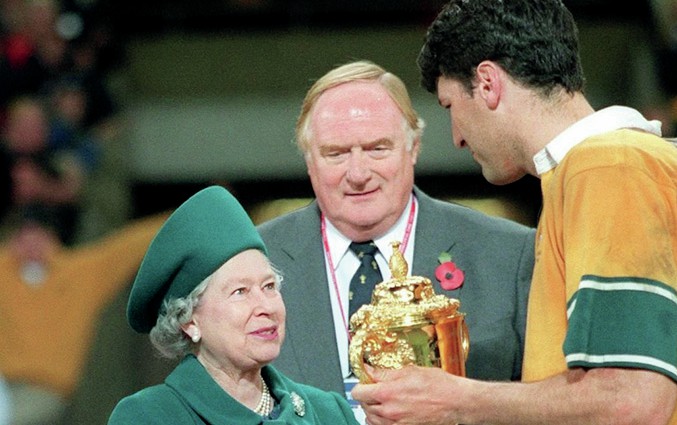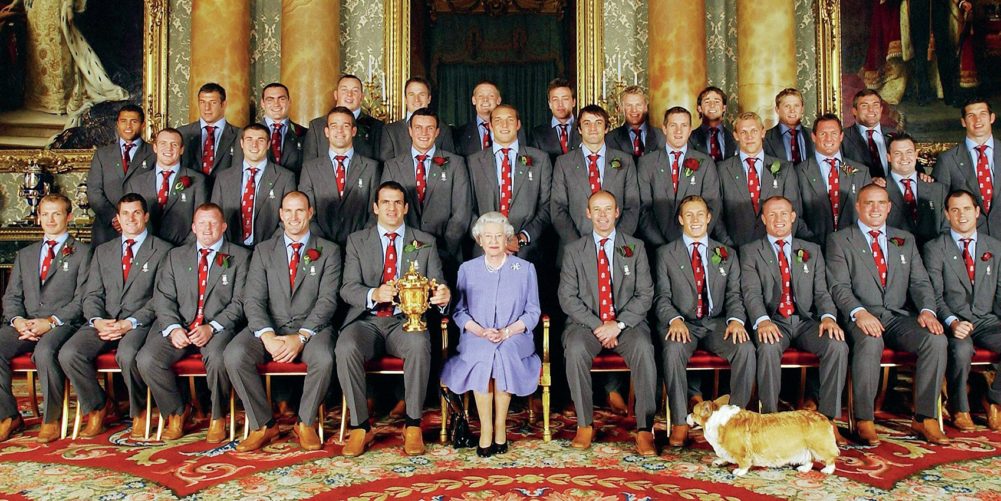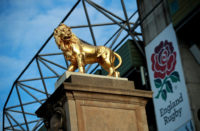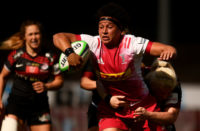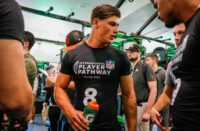Although it would be a stretch to suggest that Her Majesty The Queen was a diehard rugby fan, she left a surprisingly large imprint on the rugby world, present and correct at many notable rugby events throughout her reign.
She was, for example, the only person ever to present the World Cup to the winning captain on two occasions – 1991 and 1999 – while the reception at Buckingham Palace in December 2003 for England's conquering heroes came at her suggestion. She served as the RFU's patron for an extraordinary 64 years before passing on the baton to Prince Harry in 2016 while the Duchess of Cambridge now fills that role.
During her reign Her Majesty had 15 Prime Ministers serve under her but during her RFU patronage I make it 68 different England captains.
Her involvement with rugby was possibly twofold. Horse racing and equestrianism were her abiding sporting passion but that was matched by her desire to support and recognise all British sporting teams and individuals. She also believed in excellence, anything that put Britain in a good light and provided an example, and frequent morale booster, for the country at large.
Secondly of course she was the Head of the Commonwealth of Nations and Rugby Union, at least for much of its history, was very much a game of Empire and then the Commonwealth. It was one of those sports like cricket that provided instant common ground among her subjects, a sporting Esperanto if you like and as such was to be g reatly encouraged.
And beyond the Commonwealth as well. During her historic healing visit to Ireland in 2013, Brian O'Driscoll and rugby colleagues from north and south of the border were on hand as high-profile guests to provide both stimulating conversation and tangible evidence as to how both communities cannot only coexist but thrive by working together. Ireland's rugby team has always made light of the border and decades of tension and “Troubles” and had only gone and won another Grand Slam just a few months earlier.
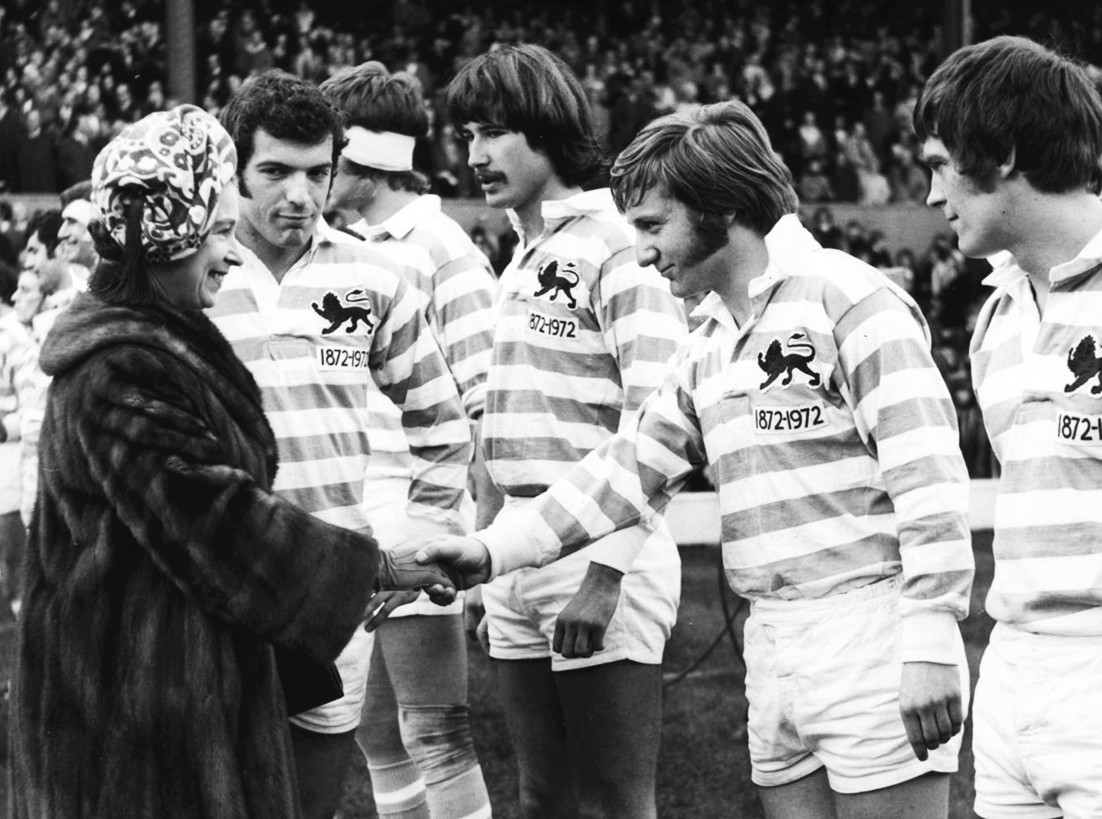
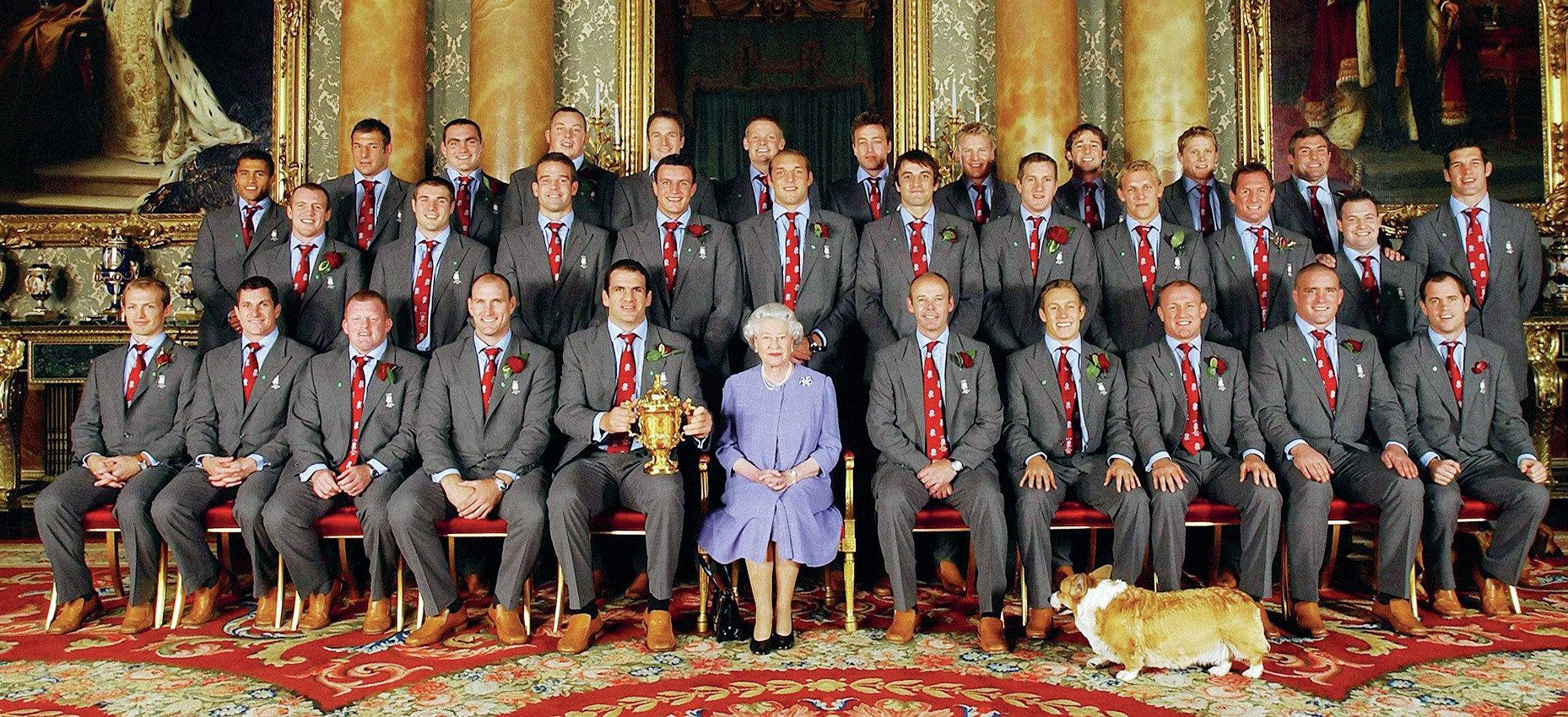
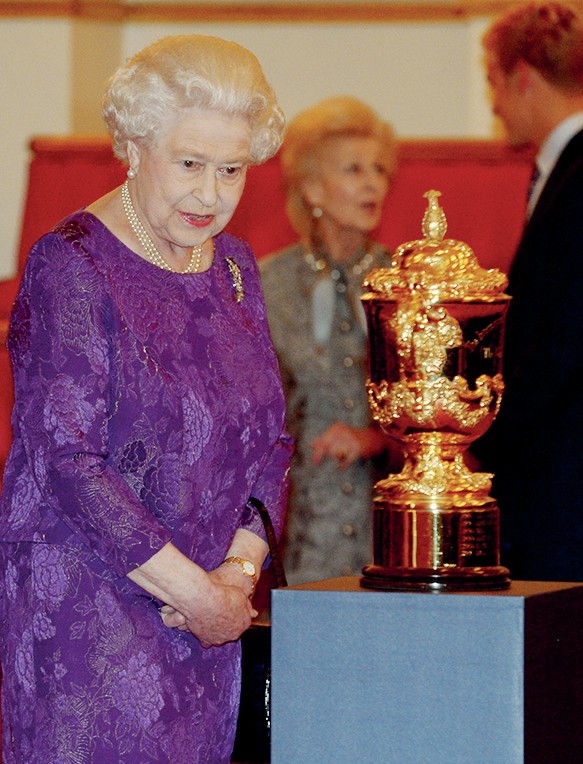
Her Majesty may have struggled with intricacies of the off-side law – join the club, Ma'am – but there is no question that she enjoyed the company of rugby folk.
Looking down through the archives, Her Majesty pops up all over the place. There she is, for example, at Twickenham in 1971 to do the honours as the RFU celebrated their centenary with a match against an Overseas World XV which was captained by New Zealand skipper Brian Lochore.
Her Royal Presence and the gala feel of the match did not prevent a little bit of “biff ” once she had been presented to the two teams. England flanker Budge Rogers takes up the story.
“It was hard going. I remember early on I got a kick in the back from Colin Meads – another one – who as we got up informed me ‘That's for Waka'. Long memories those Kiwis. Back in 1967 I had been playing for the East Midlands against the All Blacks and was having my usual ding dong battle with Waka at the back of the lineout. He was a great player but used to get away with absolute murder and finally I let him have a short arm jab and connected so sweetly that I broke his cheekbone. That was his tour over and there was a bit
ough the broke his cheekbone. That was his tour over and there was a bit of a fuss about it although I have never met an All Black who wouldn't have done exactly what I did. Anyway four years later, in a celebration Centenary game in front of The Queen and a packed house at Twickenham, it was payback time.”
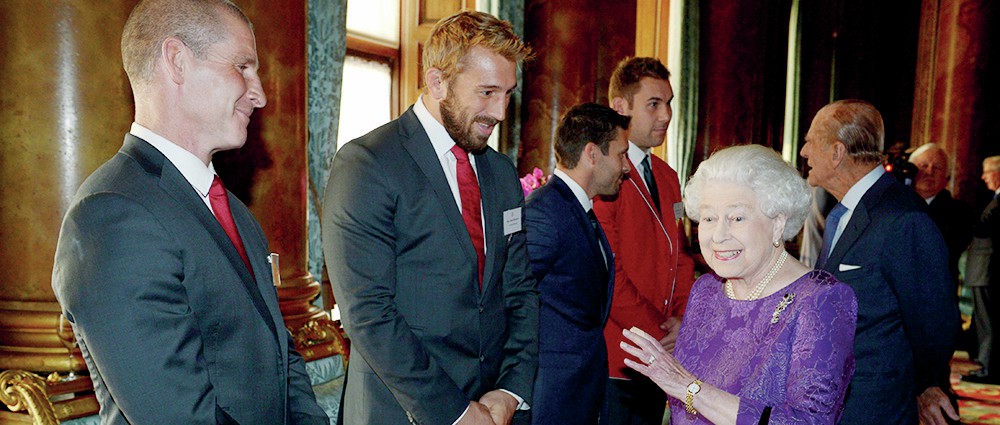
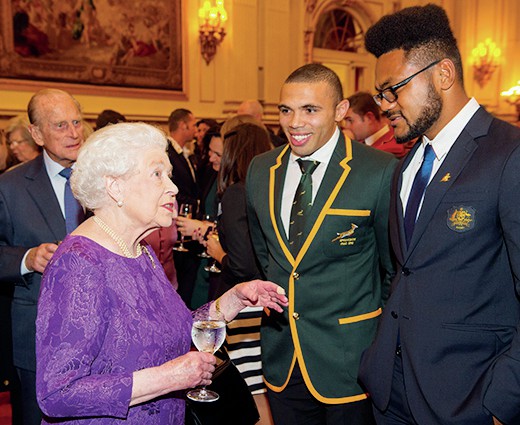
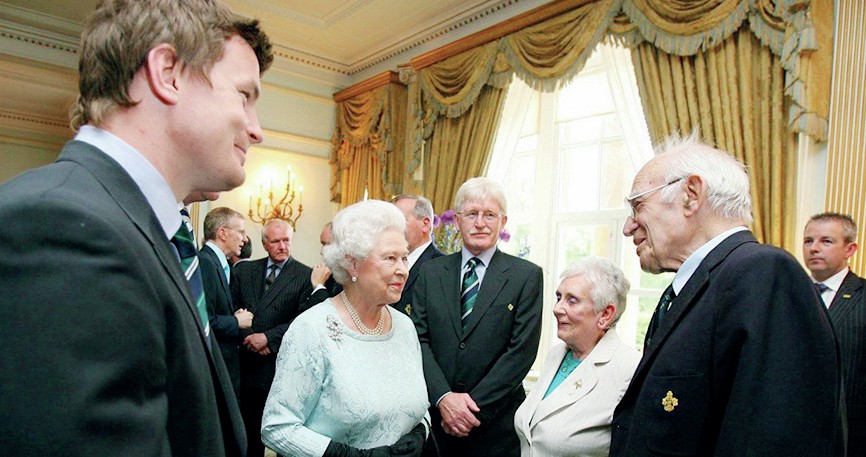
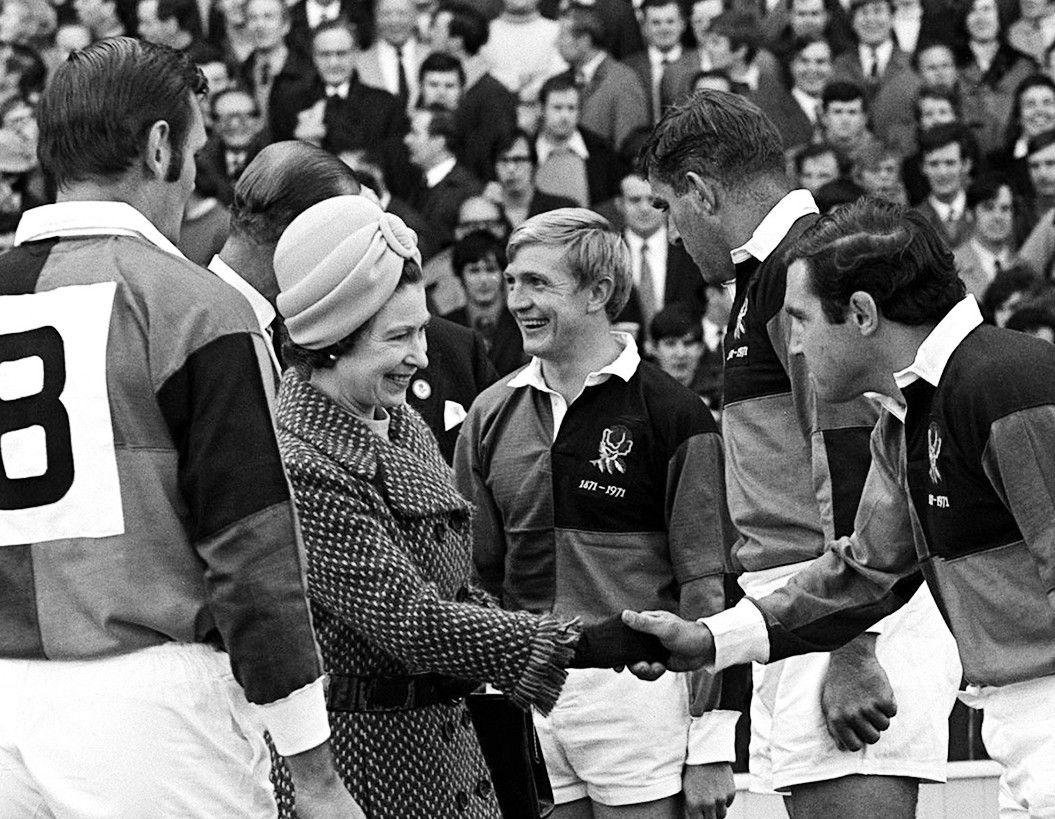
Happily, the fracas went undetected by the referee and The Queen was spared the embarrassment of King Geroge V who witnessed New Zealand skipper Cyril Brownlee being sent off against England at Twickenham in the first half in 1925 and reportedly requested at half time that he be allowed to return. Unsuccessfully.
I note that in 1972 she was the guest of honour at the Centenary Varsity Rugby match and brought good luck to the Light Blues who not only ended a run of three Oxford wins but started a run of five straight wins of their own.
Her Majesty was a continuing presence throughout the decades. As rugby fever gripped the country in 1991, she was of course invited to attend the final at Twickenham and present the trophy. A tricky assignment in many ways as she was both Queen of the United Kingdom and Australia. Diplomacy was her forte though and she managed to be both happy and pleased when presenting the trophy to Nick Farr-Jones and a consoling presence when handing out the losers' medals to Will Carling and the England squad.
On the eve of professionalism in 1994 she was again guest of honour at Twickenham, this time to open the new stand as HQ geared up for the brave new world, and meet the England and Wales teams. Again, a tricky day with no perception of bias or favouritism permissible despite her patronage of the home side. England won the match but Wales nonetheless took the Five Nations championship.
In 1999 none of the British sides threatened to reach the World Cup Final so on that occasion at the Millennium Stadium she was treated to an Australian-French affair, comfortably won by the Aussies. This time it was John Eales, who she had presented with a winners' medal eight years earlier, who stepped forward to receive the Webb Ellis trophy.
In more recent years of course there was also the direct involvement of her family to maintain the rugby connection. If HRH Princess Anne has missed a game at Murrayfield since she became patron in 1985 I would be very surprised while Princess Anne's son Peter Phillips played for Scotland Schools while a student at Gordonstoun and her son-in-law is, of course, England World Cup winner Mike Tindall.
England's World Cup triumph in 2003 was clearly special and as she watched at home on the TV she immediately tapped into the vibe and what it meant for the English part of her realm. Her grandsons William and Harry were camp followers down in Australia and provided regular updates on the momentous event.
A few phone calls from her private secretary and a royal reception at Buckingham Palace was organised on December 8 to coincide with the parade to Trafalgar Square and the reception at No 10 Downing Street. A very “large” and high spirited day by any standards in which drink was taken copiously by the conquering heroes, the larger squad and their partners.
I have always loved the moment when Martin Johnson presented the trophy back to her for inspection at Buckingham Palace and she expressed extreme surprise that it was still in one piece. She knew sportsmen and sportswomen and their jinx.
The pictures from Buckingham Palace that day show a team really relaxing despite the regal setting and the team picture with The Queen, one of her corgis running free at their feet, is probably the definitive team picture of that exceptional group. I would be surprised if that is not the mantelpiece or hung in the study of almost all concerned.
Even with advanced years she remained loyal and encouraging to the game. The 2005 All Blacks, one of the greatest sides ever, were treated to a reception, while on a high-profile Royal tour to Wales in 2012 Ryan Jones was asked to gather his Grand Slam-winning side for a special reception.
Perhaps most notably of all was a huge reception she held for all the teams contesting the 2015 World Cup, the kind of multi-nation, multi-cultural gathering of the clans at which she truly excelled. Again you look at the pictures and are left in no doubt that all those attending enjoyed a hell of a good rugby evening with the formalities pretty low key.
